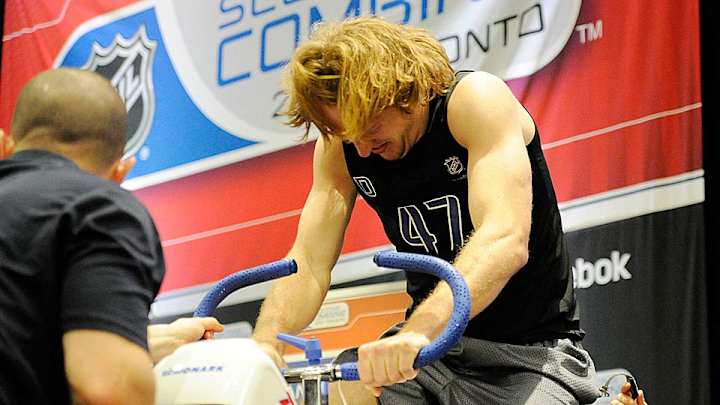NHL Scouting Combine interviews often hardest part for prospects

Scouts and general managers have finished assessing the on-ice evolution of this year’s top prospects. Now, at the NHL’s Scouting Combine, they’ll have one last chance to look under hoods before they make their picks.
The event, underway this weekend at Buffalo’s Harborcenter complex, puts the players through a battery of grueling physical challenges and medical tests that are designed to guage their limits as athletes. But even the men for whom the event is staged don’t put too much stock into this portion of the event.
“We’ve watched these kids play the game. We think we have a pretty good idea who they are,” a scout told SI.com. “No one is getting drafted because of how high he jumps or how fast he pedals a bike or how many reps he does on the bench. But there’s a chance to make an impression. You want to see what they can do. I like to say it’s more about reading between the lines than the actual readings.”
NHL coach's challenge rule may prove to be blessing and curse
In other words, no one’s putting too much stock into the results put up by the workout warriors if they don’t correlate with what has happened on the ice. And if a high-end prospect washes out on the physical testing—as eventual fourth pick Sam Bennett famously did last year—well, he’s not going to be dismissed on draft day.
But scouts love to see the kids put through their paces. The two most infamous being the vomit-inducing stationary bike tests.
The VO2 Max test, which measures endurance, will be administered on Friday while the Wingate Ergometer test, designed to measure peak anaerobic power and, by extension, skating explosiveness, will be held Saturday.
That’s a huge break for this year’s prospects. The two tests used to be held on the same day, but that was changed in order to reduce fatigue and offer a more accurate assessment of the players’ legs and lung capacity.
Agent: NHL salary cap crunch may fuel run at restricted free agents
“All the kids on my team at Boston College that have been to the Combine are giving me [grief] because they’ve been doing the bike tests on one day and it was pretty tough,” Boston College defenseman Noah Hanifin told NHL.com. “We lucked out this year.”
While they dodged a bullet there, there’s no getting around the most stressful test of the weekend: the face-to-face interviews with individual teams that are used to get a read on their mental and emotional readiness.
• Confident Eichel meets with Sabres | Final prospect rankings
“We're looking for all kinds of signs,” the scout said. “What’s their maturity level? Are they confident? How hot is the fire burning? How do they handle stress? How honest are they about their strengths and weaknesses? How perceptive are they about the abilities of others?
Looking Out For No. 1: Jack Eichel is an NHL team changing talent
“We like to challenge them. Take them out of their comfort zone—well, most of them already are—but you know, find out how they deal with challenges. How quickly they think and respond. How they handle problems.
“We want to know what kind of people they are. What they do away from the rink. Their interests. Who they hang out with. Some kids have red flags in their background. We want to address them head on, find out how they're dealing with whatever it was.
“A lot of times it’s this side of a kid that determines whether he’ll be a player or not. We’re making an investment when we draft these kids. This is our last chance for due diligence.”
The scout suggested this can be the make-or-break moment for some kids. “Sometimes the character just shines through and after the kid leaves the room we look at each other and say ‘That's our guy.’ Other times, it’s too much. I’ve seen kids cry. I’ve seen them say stupid things they probably wish they could take back. We’ve [written off] players [as a result of these interviews.]
“But that's why we do the homework. [Better to be] surprised before than after we’ve [drafted] a kid.”
